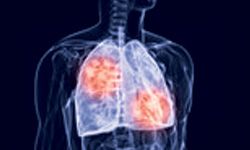PFS Doubling Observed in Patients With EGFR+ NSCLC With Addition of Platinum to Gefitinib
The addition of carboplatin and pemetrexed to therapy with gefitinib in patients with non–small cell lung cancer and an <em>EGFR</em>-sensitizing mutation had a statistically significant effect on progression-free survival and overall survival and represents a new therapy option for these patients.

The addition of carboplatin and pemetrexed to therapy with gefitinib (Iressa) in patients with nonsmall cell lung cancer (NSCLC) and anEGFR-sensitizing mutation had a statistically significant effect on progression-free survival (PFS) and overall survival (OS) and represents a new therapy option for these patients.
The addition of the chemotherapeutic agents to the first-generation EGFR tyrosine kinase inhibitor (TKI) doubled PFS time and had an absolute OS improvement of 25%, wrote the study investigators, led by Vanita Noronha, MBBS, MD, DM, in their article published in theJournal of Clinical Oncology.
Efficacy of the combination was assessed in a randomized, single-institution, open-label phase III trial against single-agent gefitinib in 350 patients with cytologically confirmed NSCLC withEGFRmutations in exon 19, 21, or 18. Mutation analysis was performed on biopsy or by cytology cell blocks by TaqMan-based real-time polymerase chain reaction. Patients had to have localized stage IIIb disease not amenable to radical therapy or stage IV disease planned for first-line systemic therapy, adequate organ function, no history of interstitial lung disease, and an ECOG performance status of ≤2.
Patients were assigned in a 1:1 randomization to either gefitinib 250 mg daily with pemetrexed 500 mg/m2and carboplatin AUC 5 every 21 days for 4 cycles followed by maintenance pemetrexed until disease progression (n = 174) or once-daily gefitinib 250 mg (n = 176).
There were 139 patients (80%) in the combination arm who completed 4 cycles of chemotherapy, 14 (8%) who had 3 cycles, 5 (3%) who had 2 cycles, and 11 (7%) who had only 1 cycle. Twenty-two (13%) patients required dose reductions and 39 (22%) required dose delays >1 day during the first 4 cycles of chemotherapy. Gefitinib was taken for a median of 327 days in this group with 39 patients holding therapy for a median of 7 cumulative days.
In the single-agent gefitinib group, the EGFR TKI was taken for a median of 260 days. Dose holds occurred in 51 patients for a median of 5 cumulative days.
The primary objective was investigator-assessed PFS, defined as the time between randomization to the date of progressive disease or death. Responses were assessed using contrast-enhanced CT scans every 3 cycles in the chemotherapy group or every 2 months in the gefitinib group. Secondary endpoints included OS, toxicity, response rate, and quality of life.
The estimated median PFS in chemotherapy-treated patients was 16 months versus 8 months in those receiving gefitinib alone (unadjusted HR, 0.51; 95% CI, 0.39-0.66;P<.001), and these improvements were consistent across patient subgroups, including those with brain metastases. Second PFS events, defined as the time from randomization to the second progressive-disease event, occurred at a median of 23 months with chemotherapy and 14 months with gefitinib alone (HR, 0.69; 95% CI, 0.53-0.92;P<.001).
The addition of chemotherapy to gefitinib resulted in a prolonged median OS that was not reached versus 17 months in the single-agent arm (HR, 0.45; 95% CI, 0.31-0.65;P<.001). Rates of OS at 18 months were 74.3% and 48.7%, respectively.
The best radiologic responses observed in patients in the gefitinib-and-chemotherapy arm were complete remission (CR) in 5 (2.9%), partial remission (PR) in 126 (72.4%), and stable disease (SD) in 22 (12.6%) versus 1 CR (0.6%), 109 PRs (61.9%), and SD in 39 (22.2%) in the gefitinib-alone arm. Thus, the objective response rate was higher for patients with chemotherapy at 75.3% versus 62.5% without. Progressive disease was observed in 9 patients (5.2%) and 12 patients (6.8%), respectively.
Clinically relevant serious toxicities occurred more with chemotherapy added to gefitinib (51%) than with gefitinib alone (25%). Excessive toxicity in the experimental arm was primarily the result of increased myelosuppression, nephrotoxicity, and hypokalemia when compared with the control. Common grade ≥3 toxicities occurring in >5% of patients with chemotherapy included hypertension (26.2% vs 23.5% without chemotherapy), hyponatremia (23.8% vs 15.9%), anemia (19.5% vs 1.1%), neutropenia (15.9% vs 0%), diarrhea (14% vs 8.2%), febrile neutropenia (11% vs 0%), non-neutropenia infection (11% vs 5.9%) hypokalemia (7.9% vs 1.2%), renal dysfunction (6.1% vs 0.6%), and nausea (5.5% vs 1.8%).
Thirty patients discontinued pemetrexed as a result of toxicitiesincluding nephrotoxicity, febrile neutropenia, non-neutropenic infections, and gastrointestinal toxicities—but continued therapy with gefitinib. One patient each in the gefitinib arm discontinued therapy as a result of interstitial lung disease and non-neutropenic infection. There were 2 fatal toxicities in the entire cohort; one occurred due to febrile neutropenia in the chemotherapy arm as well as one case of interstitial pneumonitis in the gefitinib-only arm.
“All the landmark trials in which anEGFR-directed oral TKI was compared with platinum-based doublet chemotherapy demonstrated a PFS benefit, but because of various factors including crossover, none demonstrated an OS benefit,” wrote the study investigators. “To the best of our knowledge…the [gefitinib plus chemotherapy] regimen used in the present trial is [one of] the only regimens that prolongs OS over standard of care inEGFR-mutated lung cancer.”
Reference:
Noronha V, Patil VM, Joshi A, et al. Gefitinib versus gefitinib plus pemetrexed and carboplatin chemotherapy in EGFR-mutated lung cancer [published online August 14, 2019].J Clin Oncol. doi: 10.1200/JCO.19.01154.
Kim Evaluates New Regimens for EGFR+ Lung Cancer
January 20th 2025During a Community Case Forum event in partnership with the Medical Oncology Association of Southern California, Edward S. Kim, MD, MBA, discussed the FLAURA2 and MARIPOSA trials of newer regimens for EGFR-positive lung cancer.
Read More
Amivantamab/Lazertinib Maintains OS Benefit in EGFR+ NSCLC
January 15th 2025During a Case-Based Roundtable® event, Joshua K. Sabari, MD, continued discussion of key outcomes from the MARIPOSA trial and toxicity management in patients with EGFR-mutated non–small cell lung cancer in the second article of a 2-part series.
Read More